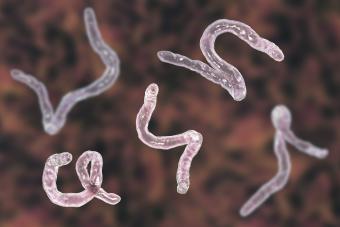
If your pet has recently been treated for parasites, it's natural to wonder whether you can catch these creepy crawlies from your kitty. The answer is yes: humans can get worms from cats, but only certain types. Transmission isn't just as simple as kissing your cat on the face, because there are plenty of other ways you can get cat worms. Discover how exactly people get worms from pets and what to look for so you can protect your family.
There are two types of worms that you need to be concerned about when it comes to human contact: roundworms and hookworms.
1. Roundworms
Roundworms are long, spaghetti-like worms, and they feed on nutrients within an animal's intestines.

How People Get Roundworms From Cats
Cats who are infected with this parasite will shed the roundworm eggs in their feces. If you scoop the litter box and then don't wash your hands and prepare food or touch your mouth, there's a chance you could accidentally ingest the egg and become infected yourself. Digging around in contaminated soil or sandboxes can also lead to infection if you don't wash your hands.
Symptoms in Humans
People aren't the ideal hosts for these cat parasites, so instead of growing into adult worms within our intestines, the roundworm larvae move around. They'll migrate to other organs, like the liver, lungs, eyes, and more. Some symptoms of these migrants include:
- Vision problems
- Cough
- Painful belly
- Enlarged liver
- Headache
- Fever
- No appetite
- Weight loss
- Fatigue
- Rash
Treatment for Roundworms
Treatment for roundworms in humans can include medications, such as Mebendazole (Vermox) or Albendazole (Albenza), which are prescription oral tablets. You can prevent infestations by deworming your cat regularly and washing your hands often, especially after handling your cat's food, water, or waste.
2. Hookworms
Hookworms are worms that are usually not visible to humans. This is because they're very small and attach themselves to the inside of a pet's intestines to feed on their blood.

How People Get Hookworms From Cats
Like with roundworms, you can get hookworms if you accidentally ingest a worm egg after handling your cat or their feces. But hookworm larvae can also enter a person's body through the skin. For example, you could get hookworms by walking barefoot in an area where an infected cat pooped, like a sandbox or the beach.
Symptoms in Humans
Hookworm infections are dangerous for both animals and people. Anemia and nutritional deficiencies are common results of hookworm infections in humans, and it can even prevent proper mental development in children who get hookworms from cats frequently. Some people don't show any symptoms of infection, but some common signs include:
- Itchy, allergy-like rash on the feet and/or hands
- Red, twisting lesions on the skin
- Fever
- No appetite
- Painful abdomen
- Coughing
- Diarrhea
- Anemia
Treatment for Hookworms
Albendazole (Albenza) or Mebendazole (Emverm) may be prescribed to be taken orally for one to three days to kill the parasites within your body. You can take action to avoid future infections by deworming your cat, properly disinfecting areas where your cat may have defecated, and wearing gloves and shoes when touching any of those areas.
Fleas from your cat can potentially infect you with tapeworms, although the risk is minimal. According to the CDC, there are only a few reported cases in children.
Ringworm in Pets and Humans
Because of its name, many people think that ringworm is a type of worm, but in actuality, it is a fungal infection. It's distinguished by a reddish rash that usually has the shape of a ring, and it's very contagious. Contact with a cat's ringworm often results in that person also developing ringworm. It can usually be treated with over-the-counter medication, and it should clear up within two to four weeks.
Preventing Worms Is Your Best Strategy
The best way to keep yourself and your family safe from worms is to keep your cats free of them. Keep your cat indoors to reduce their risk of infection and have your cat regularly dewormed if they catch mice or other prey. That way, you won't have to worry about them passing these gross parasites onto your family.







